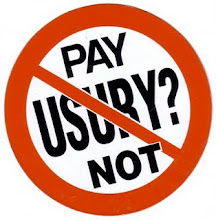Bankers Gone Wild ...

1. SOME HISTORY
This story begins back before the United States was the United States.
The original thirteen colonies printed their own currency, and it worked very well at empowering commerce and turning the young America into a powerful growing economy, free of the poverty and unemployment that even then crippled London. But the bankers of Europe, long used to private banks issuing the public currencies, were horrified by the American approach and saw it as a threat to their deeply cherished religious belief that the gods intended for the bankers to have all the wealth of the world. So, the Bank of England lobbied King George III to impose the Currency Act on the colonies, which forbade the colonies to use their own money and required them to borrow their lawful tender from the Bank of England, at interest.
It took only a few years for this scheme to reduce the formerly prosperous and productive colonies down to the poverty and unemployment typical of London at the same time period, as depicted in the literature of Charles Dickens, among others.
While the state-run American schools teach that the revolution was about the Stamp act and the Tea tax, it was primarily the rage created by the enforced impoverishment of the Currency Act which fueled the rebellion. Why the Currency Act is not mentioned in the public schools will become apparent further on.
2. THE ORIGINAL AMERICAN ECONOMY
Following the American Revolution, the Founding Fathers reverted back to the system which had worked so well before the Currency Act.
As the above diagram shows, the Founding Fathers of this nation set up a simple economic system that did not rely on a private central bank. Government issued the public currency and spent it into circulation where it was used by the public free of interest. Then the money was taxed back into the government's hands, then to be re-spent back into circulation. For each fiscal year the money issued equaled the money collected. Nothing was lost. The dollar was based on a weight measure of silver, which meant the value of a dollar was fixed and not subject to the whims of government or bankers. (snip) ...
Read the complete article at this website:
http://whatreallyhappened.com/WRHARTICLES/wildbankers.php


0 Comments:
Post a Comment
<< Home